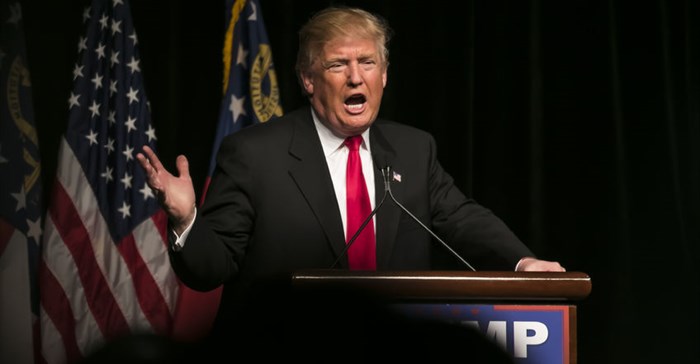
Subscribe & Follow
Jobs
- Public Relations Writer Midrand
- PR Account Manager Johannesburg
- Head of Content – What’s On, UAE & KSA Dubai
- PR and Digital Content Writer Sandton
- Group Account Director - Consumer PR and Influencer Cape Town
- Event Manager - PR Agency Johannesburg, Cape Town or DBN
Why does he talk like that? Seven language 'lessons' from The Donald
If you listen and watch closely, you’ll hear and see explosive noun phrases, self-interruptions, departures from the theme, flashes of memory, odd side remarks; in a nutshell, the disordered language of a person with a concentration problem.
Take a look at this snippet:
- Look, having nuclear – you know, if you’re a conservative Republican, if I were a liberal, if, like, okay, if I ran as a liberal Democrat, they would say I'm one of the smartest people anywhere in the world – it’s true! – but when you're a conservative Republican they try – oh, do they do a number – but you look at the nuclear deal, the thing that really bothers me – it would have been so easy, and it’s not as important as these lives are (nuclear is powerful; my uncle explained that to me many, many years ago, the power and that was 35 years ago; he would explain the power of what's going to happen and he was right – who would have thought?)
Nobody talks like this in politics because, for one thing, it's against the rules of “the political discourse”. For another, it’s all over the place and doesn’t really make sense. It may be on the back of the above nugget of inexplicability that Republican strategist Rory Cooper asserted that Trump “exercises his right to word vomit”.

Barton Swain, one-time speechwriter for former South Carolina Governor Mark Sanford, points out that Trump’s ‘speeches’ are characterised by a series of interrupted sentences and bizarre asides. They’re not sustained arguments but a mishmash of disjointed statements that don’t combine into something greater.
So what, if anything, can communicators learn from the language of Trump?
1. Confidence vs over-confidence
Trump believes that he is a brilliant orator. He believes that broad appeal is commanded by the name ‘Trump’, and has strong confidence that this appeal can transform into electoral votes. Indeed, you could argue that he entered politics because he was such a well-known brand to begin with. And his zealots love him.
But as a political speaker, Trump is so far outside the box that he’s made it difficult for neutral voters to get a clear picture of his appeal to supporters.
2. Rejecting the way it’s always done
Trump does not give a speech in the traditional sense; in fact, he’s contemptuous of the entire genre of political speech-making and its teleprompters: “Everybody falls asleep, listening to the same old stuff, the same old lies. So much easier." If you’re tired of hearing the same old stuff, from the same old American families, and you mistrust the pretense and officialese of the status quo, perhaps Trump appeals?
3. Using a conversational tone
Trump uses sentence fragments instead of complete sentences. Much like free verse poetry, his statements lack grammatical connection in many cases. This leads many people, including me, to think he sounds largely incoherent when he talks. But conversational talk is something everybody does on an everyday basis, in everyday interaction. So there are many who find it to be a relatable style of speaking.
4. Performing for the viewer…
…and not the reader or even the listener. Trump’s speaking style has its roots in oral culture. His apparent incoherence has two main causes: false starts and parentheticals. But both can be effectively signaled in speech – by emphasis and intonation in the voice, along with gesture, posture, and gaze – and so those watching can largely factor them out. In other words, Trump’s rambles are much easier to follow in person, thanks to subtle visual and verbal cues.
5. Speaking the language
Many voters support Trump because he sounds like them. He speaks the language of his audience, using the vernacular to cut through the complexity of political conversations. While the more eloquent, more erudite politicians can come across as if they're addressing only an intellectual elite, Trump seems to speak to everyone.
However, he also offends like a pro. When he addressed a group of African-American voters, he asked them, “What the hell do you have to lose?” In this case, he talked down to a community that already feels marginalised in its own country.
6. Re-framing any negatives
Trump re-frames every debate question into language he prefers and ably spins negativity instead of defending against it. If voters accuse him of being racist, he says he’s pro-security. When he’s accused of being sexist, he says he’s simply opposed to imposed political correctness. Whatever the issue, Trump puts things into more favourable terms; terms that are usually kinder to his brand.
7. Repetition, repetition, repetition
Trump endlessly repeats his narratives, drops the names of successful people he hangs around with, and takes on all the trappings of power and money. In short, he acts and plays the part relentlessly, rallying observers through impassioned, targeted, and repeated messaging – even if it doesn’t always follow a clear story arc.
Take, for example, Trump’s frequent use of "Many people are saying..." or "Believe me" – often right after saying something that is baseless or untrue. This tends to sound trustworthier than simply stating the baseless claim, since Trump implies that he has direct experience with what he’s talking about.
So what’s the bottom line, then?
Do the stuff that works for your writing and content, dump the stuff that doesn’t and don’t forget that, if nothing else, your messaging must take a stand for what it believes in and tell people how it plans to get there. Or it’s just more waffle.
While you’re deciding what your copy believes in, you should know that “One of the key problems today is that politics is such a disgrace. Good people don’t go into Government.” Trump said that. And there, at least, I completely agree with him.
*I couldn’t present this piece as entirely truthful without the following disclaimer: In my opinion, Donald Trump has the moral, social, professional and political value of a prokaryote, the lowest known form of life. He is also dangerous and a pillock.


















